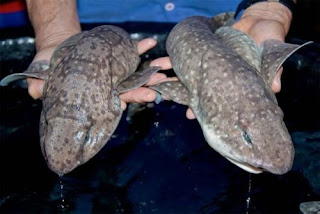About a month ago, one of Newsy’s team members shared to me this spectacular news: 300 new species were discovered in the Philippines! The said species were said to have been found in various points in Luzon, where the California Academy of Sciences and other Filipino scientists from both private and government institutions conducted a six-week exploration. Included in the biodiversity hotspots visited were “Lake Taal, Anilao and the Verde Island Passage in Batangas, and the mountains of Makiling in Laguna, Banahaw in Quezon, Malarayat in Batangas and Isarog in Bicol.”
Inflatable shark said to “suck water into its stomach to bulk up and scare off predators”
Laughing cicada, which locals thought were dwarves laughing
Among the many interesting natural finds were a laughing cicada (called such due to the high-pitched “laughing” sound it produces), an inflatable shark/ deep sea swell shark, several kinds of insects and spiders, deep-sea corals, sea urchins and sea slugs. Some of these slugs may be developed to formulate anti-carcinogenic drugs as well as potential HIV and AIDS treatment.
Nudibranchs or sea slugs found during the expedition
Other interesting natural finds during the team’s expedition were a marine worm that “spreads sperm as it swims”, hair-like sea urchins, and a starfish smaller than a centavo, that feeds exclusively on driftwood.
While this recent discovery is one that we Filipinos, can be truly proud of, – and one which proves just what a curious, splendid country the Philippines is, and how blessed it is in terms of biodiversity – also undeniable is the effect that negligence and carelessness has on our biodiversity.
CAS Senior Scientist John McCosker ‘expressed alarm that the amount of trash exceeded the amount of life. “Trawls would comb the ocean 2,300 meters from the surface for half an hour and come up yielding more plastic than fish. Some barnacles have even started adapting to the plastic,” he said.’
A type of barnacle found during the exploration
Adapted to plastic? Wow. I thought we were the only ones.
Interestingly, this mollusk was discovered to bear no shell for protection. It produces toxins to ward off predators.
A considerable portion of our biodiversity here are in threat of being, if not already endangered, because of several contributing factors outside global warming. Sadly, many of these factors are preventable, such as dynamite fishing and carelessly throwing waste in the ocean. I hope that this news serves as a wake-up call for all of us, that we may take part in exercising responsibility and awareness on the large-scale effects our actions have on the environment, so more people can still get to experience this natural richness in the years to come.
Today’s a good day to start.
The entire Newsy newscast edition on the topic can be viewed below.
Thanks to the Newsy team for helping us get the word out there about these wonderful Philippines attributes. To the rest of us, if I may quote from Mr. McCosker, ““The sun hasn’t set yet on your oceans. There is great hope in the Philippines.”
*The Philippine Daily Inquirer features an extensive article on the topic HERE.
